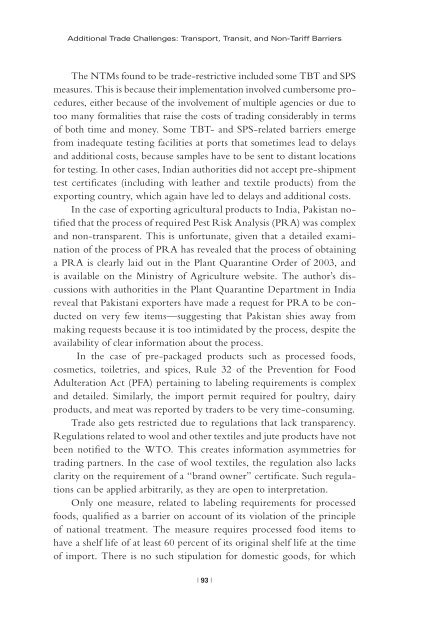You also want an ePaper? Increase the reach of your titles
YUMPU automatically turns print PDFs into web optimized ePapers that Google loves.
Additional <strong>Trade</strong> Challenges: Transport, Transit, and Non-Tariff Barriers<br />
The NTMs found to be trade-restrictive included some TBT and SPS<br />
measures. This is because their implementation involved cumbersome procedures,<br />
either because of the involvement of multiple agencies or due to<br />
too many formalities that raise the costs of trading considerably in terms<br />
of both time and money. Some TBT- and SPS-related barriers emerge<br />
from inadequate testing facilities at ports that sometimes lead to delays<br />
and additional costs, because samples have to be sent to distant locations<br />
for testing. In other cases, <strong>India</strong>n authorities did not accept pre-shipment<br />
test certificates (including with leather and textile products) from the<br />
exporting country, which again have led to delays and additional costs.<br />
In the case of exporting agricultural products to <strong>India</strong>, <strong>Pakistan</strong> notified<br />
that the process of required Pest Risk Analysis (PRA) was complex<br />
and non-transparent. This is unfortunate, given that a detailed examination<br />
of the process of PRA has revealed that the process of obtaining<br />
a PRA is clearly laid out in the Plant Quarantine Order of 2003, and<br />
is available on the Ministry of Agriculture website. The author’s discussions<br />
with authorities in the Plant Quarantine Department in <strong>India</strong><br />
reveal that <strong>Pakistan</strong>i exporters have made a request for PRA to be conducted<br />
on very few items—suggesting that <strong>Pakistan</strong> shies away from<br />
making requests because it is too intimidated by the process, despite the<br />
availability of clear information about the process.<br />
In the case of pre-packaged products such as processed foods,<br />
cosmetics, toiletries, and spices, Rule 32 of the Prevention for Food<br />
Adulteration Act (PFA) pertaining to labeling requirements is complex<br />
and detailed. Similarly, the import permit required for poultry, dairy<br />
products, and meat was reported by traders to be very time-consuming.<br />
<strong>Trade</strong> also gets restricted due to regulations that lack transparency.<br />
Regulations related to wool and other textiles and jute products have not<br />
been notified to the WTO. This creates information asymmetries for<br />
trading partners. In the case of wool textiles, the regulation also lacks<br />
clarity on the requirement of a “brand owner” certificate. Such regulations<br />
can be applied arbitrarily, as they are open to interpretation.<br />
Only one measure, related to labeling requirements for processed<br />
foods, qualified as a barrier on account of its violation of the principle<br />
of national treatment. The measure requires processed food items to<br />
have a shelf life of at least 60 percent of its original shelf life at the time<br />
of import. There is no such stipulation for domestic goods, for which<br />
| 93 |


